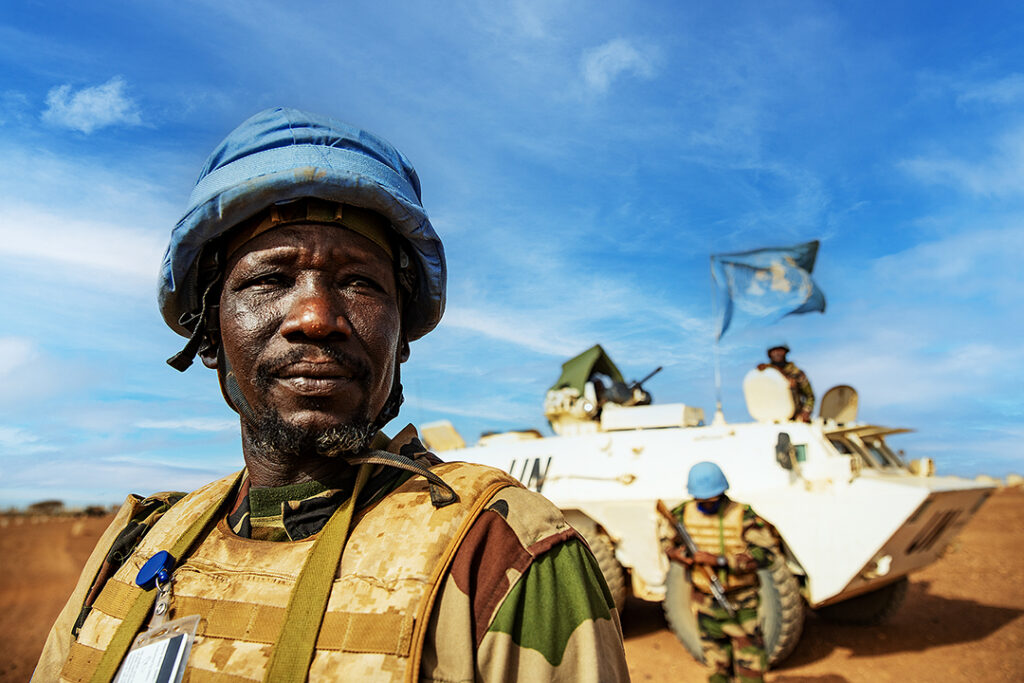ADF STAFF
Tuareg community leader Sheikh Mohamed and his family were among the hundreds of Talataye residents who fled their homes after militants affiliated with the Islamic State group attacked in September 2022.
It was part of an all-too-familiar surge of violence in Mali, where several extremist groups control large parts of the rural north and center regions.
“Our homes were burned and cattle killed by Daesh,” he said, using the Arabic acronym for the Islamic State. “We have lost everything.”
Mohamed and his family trekked 145 kilometers west through the desert to Gao, the regional capital, where they settled alongside thousands of others in makeshift tents at the Sosso-Koira camp.
There he met Ulf Laessing, head of the Sahel Program for the think tank Konrad Adenauer Stiftung, and shared his story for Laessing’s May 3 article in New Lines magazine.
Like most displaced people, Mohamed and his family depend upon foreign humanitarian aid. His children attend school in a tent provided by the United Nations.
While Mali’s military-led government has clashed with and criticized the U.N., Mohamed counts himself among the local citizenry that fears the possibility of a withdrawal by U.N. peacekeepers.
The mission in Mali, called MINUSMA, has struggled along with the civilians it is mandated to protect from extremist fighters who have waged an insurgency since 2012.
MINUSMA also has a contentious relationship with the military junta’s transitional government, which has restricted the mission’s movements on the air and ground.
U.N. Secretary-General Antonio Guterres’ internal review of MINUSMA called Mali “one of the most difficult operating environments for peacekeeping.”
One of the largest U.N. missions in the world, MINUSMA helped stabilize the main cities in Mali’s north and center, but it also has become the most dangerous peacekeeping mission with 281 troops killed since it deployed in 2013.
With challenges in every direction and a U.N.-leading budget of $1.26 billion a year, MINUSMA’s future is uncertain.
U.N. experts and Security Council leaders have proposed significant changes to the MINUSMA’s mandate, which expires on June 30.
The roughly 14,000-strong peacekeeping mission also expects to face a critical shortage of personnel with the impending withdrawal of nearly 3,000 troops by Benin, Côte d’Ivoire, Germany and England.
Insecurity has worsened since the junta invited Russia’s infamous Wagner Group mercenaries to work with its armed forces on counterterrorism operations in December 2021.
Attacks on civilians and U.N. peacekeepers have increased in central Mali, where the Malian military and mercenaries have focused their efforts.
MINUSMA commanders told Laessing that “criminality, insecurity, lawlessness and poor governance have risen in recent years.”
“Large towns like Gao and Timbuktu, where U.N. peacekeepers are based, had maintained some sense of normality until now,” he wrote. “The reported brutality of Wagner mercenaries has driven more villagers into the hands of jihadists, who claim to offer protection if their rules are followed.”
In the absence of government services and a military presence in rural parts of Mali, extremists are taking more territory and appear prepared to hold it and govern.
The deteriorating security situation coupled with MINUSMA’s uncertain future has cast a pall over locals and foreign personnel alike.
“If MINUSMA leaves, Gao and other towns won’t be secure anymore,” the head of a local nongovernment organization told Laessing. “You even have sleeper cells inside Gao scouting the town but not doing much yet. But this can change.”

